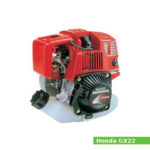
It has a 33.0 mm (1.3 in) cylinder bore and 26.0 mm (1.02 in) piston stroke. The compression ratio rating is 8.0:1.
The GX22 engine produced 1.0 PS (0.74 kW; 1.0 HP) at 7,000 rpm of maximum horsepower and 1.09 N·m (0.1 kg·m, 0.8 ft·lb) at 6,500 rpm of maximum torque.
The Honda GX22 features:
- Overhead valve (OHV) design
- Transistorized magneto ignition system
- Diaphragm type carburetor
- Centrifugal governor
- Pumping spray lubrication system
- Forced air cooling system
- Recoil starter
General information
| Engine Specifications | |
| Engine model | GX22 |
| Engine type | 4-stroke, OHV, single-cylinder |
| Displacement | 22 cm3, (1.34 cu·in) |
| Max. horsepower | 1.0 PS (0.74 kW; 1.0 HP) at 7,000 rpm |
| Max. torque | 1.09 N·m (0.1 kg·m, 0.8 ft·lb) at 6,500 rpm |
| Cooling system | Forced air |
| Air cleaner | – |
| Lubricating system | Pumping spray |
| Ignition system | Transistorized magneto ignition |
| Fuel system | Diaphragm type |
| Fuel consumption | 250 g/HPh |
| Fuel tank capacity | 0.45 L (0.12 US. gal. 0.1 Imp. gal.) |
| Fuel used | Unleaded gasoline (octane number 86 or higher) |
| Starting system | Recoil starter |
| Stoping system | Ignition primary circuit ground |
| Governor | Centrifugal governor |
| PTO shaft rotation | Counterclockwise (from PTO shaft side) |
| Dimensions (L x W X H) | 210 x 251 x 249 mm (8.3 x 9.9 x 9.8 in) |
| Dry weight | 3.3 kg (7.3 lbs) |
Cylinder Block and Head
| Cylinder block | |
| Compression ratio: | 8.0:1 |
| Cylinder bore: | 33.0 mm (1.3 in) |
| Piston stroke: | 26.0 mm (1.02 in) |
| Cylinder internal diameter (standard): | 33.000 mm (1.2992 in) |
| Piston skirt outer diameter (standard): | 32.990 mm (1.2988 in) |
| Number of piston rings (compression / oil): | 2/1 |
| Ring end gap (Top): | 0.100-0.250 mm (0.0039-0.0098 in) |
| Ring end gap (Second): | 0.100-0.250 mm (0.0039-0.0098 in) |
| Ring width (Top): | 0.980 mm (0.0386 in) |
| Ring width (Second): | 0.980 mm (0.0386 in) |
| Ring width (Oil): | 0.015-0.050 mm (0.0006-0.002 in) |
| Crankshaft center distance: | 13.0 mm (0.51 in) |
| Cylinder head | |
| Valve arrangement: | OHV, belt driven |
| Valves: | 2 |
| Valve steam diameter (INTAKE): | 3.985 mm (0.1569 in) |
| Valve steam diameter (EXHAUST): | 3.950 mm (0.1555 in) |
| Camshaft lobe height (INTAKE): | 22.790 mm (0.8972 in) |
| Camshaft lobe height (EXHAUST): | 22.790 mm (0.8972 in) |
Tightening torque specs
| Tightening torque specs | |
| Flywheel nut (M8) | 15 Nm; 1.5 kg·m; 11 ft·lb |
| Crankcase bolt (M5 5×55 mm) | 7 Nm; 0.75 kg·m; 5.1 ft·lb |
| Crankcase bolt (M5 5×18 mm) | 5 Nm; 0.55 kg·m; 3.6 ft·lb |
| Camshaft cover bolt (M4) | 3 Nm; 0.35 kg·m; 2.2 ft·lb |
| Recoil starter pulley (M8) | 8 Nm; 0.8 kg·m; 5.8 ft·lb |
| Clutch bolt (M6) | 10 Nm; 0.1 kg·m; 7 ft·lb |
| Cylinder head cover bolt (M5) | 4 Nm; 0.4 kg·m; 2.9 ft·lb |
| Standard torque values | |
| Bolt, nut (5 mm) | 5.5 Nm; 0.55 kg·m; 4.0 ft·lb |
| Screw (3 mm) | 1 Nm; 0.1 kg·m; 0.7 ft·lb |
| Screw (6 mm) | 9 Nm; 0.9 kg·m; 6.5 ft·lb |
Service Data
| Idle speed: | 3,100 ± 200 rpm |
| Cylinder compression: | 2.9-5.9 kg/cm2 (0.3-0.6 MPa, 41-84 psi) at 1,200 rpm |
| Valve clearance | |
| Intake valve clearance: | 0.12 ± 0.02 mm (0.005 ± 0.001 in) |
| Exhaust valve clearance: | 0.15 ± 0.02 mm (0.006 ± 0.001 in) |
| Oil system | |
| Lubrication system: | Pumping spray |
| Oil type: | Honda 4-stroke or an equivalent (SG, SF) |
| Recommended oil: | SAE 10W-30 |
| Oil capacity: | 0.1 L (0.11 US. qt, 0.09 Imp. qt.) |
| Fuel system | |
| Type: | Diaphragm type |
| Main jet: | #36 |
| Ignition system | |
| Type: | Transistorized magneto ignition |
| Ignition timing: | 27° B.T.D.C. (Fixed) |
| Spark plug: | NGK C5HSB, CR5HSB Denso U16FS-UB, U16FSR-UB |
| Spark plug gap: | 0.6-0.7 mm (0.024-0.028 in) |
| Ignition coil air gap | 0.35-0.5 mm (0.0138-0.0197 in) |
 Author:
Author:
Be the first to comment